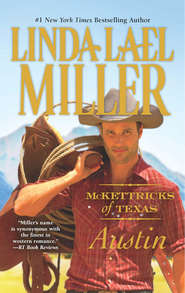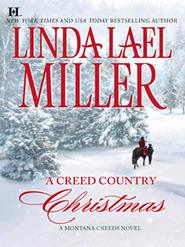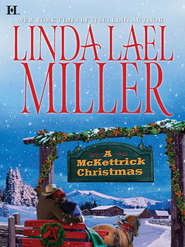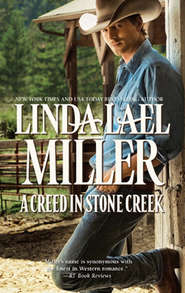По всем вопросам обращайтесь на: info@litportal.ru
(©) 2003-2024.
✖
McKettricks of Texas: Garrett
Автор
Год написания книги
2019
Настройки чтения
Размер шрифта
Высота строк
Поля
After Rachel had gone, she sat very still for a long time, wondering what she could do to help.
Only one course of action came to mind, and that was probably a long shot.
She would speak to Rachel’s father.
CHAPTER THREE
TATE WAS WAITING AT THE AIRSTRIP in his truck when Garrett landed the Cessna around five that afternoon.
Garrett taxied to a stop outside the ramshackle hangar that had once housed his dad’s plane and shut off the engines. The blur of the props slowed until the paddles were visible.
He climbed down, shut the door behind him and walked toward his brother.
They met midway between the Cessna and Tate’s truck.
Obviously, Tate had heard about the scandal in Austin by then, and Garrett figured he was there to say, “I told you so.”
Instead, Tate reached out, rested a hand on Garrett’s shoulder. “You okay?”
Garrett didn’t know what to say then. Flying back from the capital, he’d rehearsed another scenario entirely—and that one hadn’t involved the sympathy and concern he saw in his brother’s eyes.
He nodded, though he couldn’t resist qualifying that with “I’ve been better.”
Tate let his hand fall back to his side. Folded his arms. “I caught the press conference on TV,” he said. “Cox isn’t planning to resign?”
Garrett sighed, shoved a hand through his hair. “He will,” he said sadly. “Right now, he’s still trying to convince himself that the hullabaloo will blow over and everything will get back to normal.”
“How’s Nan taking all this?”
“She’s holding up okay,” Garrett said. “As far as I can tell, anyway.”
Tate took that in. His expression was thoughtful. “Now what?” he asked, after a few moments had passed. “For you, I mean?”
“I catch my breath and look for another job,” Garrett replied.
“You quit?” Tate asked, sounding surprised. If there was one thing a McKettrick didn’t do, it was desert a sinking ship. Unless, of course, that ship had been commandeered by one of the rats.
Garrett grinned wanly. Spread his hands at his side. “I was fired,” he said.
Now there, he thought, was a first. In living memory, he knew of no McKettrick who had ever been fired from a job. On the other hand, most of them worked for themselves, and that had been the case for generations.
The look on Tate’s face would have been satisfying, under any other circumstances. “What?”
Garrett chuckled. Okay, so his brother’s surprise was sort of satisfying, circumstances notwithstanding. It made up for Garrett’s skinned pride, at least a little. “The senator and I had words,” he said. “He wanted to go on as if nothing had happened. I told him that wouldn’t work—he needed to fess up, stand by his wife and his kids, if he wanted to come out of this with any credibility at all, never mind holding on to his seat in the Senate. I agreed to handle the press conference because Nan practically begged me, but when it was over, the senator informed me that my services were no longer needed.” Still enjoying Tate’s bewilderment, Garrett started toward the Cessna he’d just climbed out of, intending to roll it into the hangar. He stopped, looked back over one shoulder. “You wouldn’t be in the market for a ranch hand, would you?”
Tate smiled, but there was a tinge of sadness to it. “Permanent or temporary?”
“Temporary,” Garrett said, after a moment of recovery. “I still want to work in government. And I’ve already had a couple of offers.”
Tate’s disappointment was visible in his face, though he was a good sport about it. “Okay,” he said. “How long is ‘temporary’?”
Garrett wasn’t sure how to answer that. He needed time—thinking time. Horse time. “As long as it takes,” he offered.
Tate put out a hand so they could shake on the agreement, nebulous as it was. “Fair enough,” he said.
Garrett nodded, watched as Tate turned to walk away, open the door of his truck and step up on the running board to climb behind the wheel.
“See you in the morning,” Tate called.
Garrett grinned, feeling strangely hopeful, as if he were on the brink of something he’d been born to do.
But that was crazy, of course.
He was a born politician. He belonged in Austin, if not Washington. He wanted to be a mover and a shaker, part of the solution. Working on the Silver Spur was only a stopgap measure, just as he’d told Tate.
“What time?” he called back, standing next to the Cessna.
Tate’s grin flashed. “We’ve got five hundred head of cattle to move tomorrow,” he said. “We’re starting at dawn, so be saddled up and ready to ride.”
Garrett didn’t let his own grin falter, though on the inside he groaned. He nodded, waved and turned away.
IF RON STRIVENS, RACHEL’S FATHER, carried a cell phone, the number wasn’t on record in the school office, and since Strivens did odd jobs, he didn’t work in the same place every day, like most of her students’ parents. In the end, Julie drove to the trailer he rented just across the dirt road from Chudley and Minnie Wilkes’s junkyard, and found him there, chopping firewood in the twilight.
Seeing Julie, the tall, rangy man lodged the blade of his ax in the chopping block and started toward her.
Julie sized him up as he approached. He wore old jeans, beat-up work boots and a plaid flannel shirt, unbuttoned to reveal a faded T-shirt beneath. His reddish-brown hair was too long and thinning above his forehead, and the expression in his eyes was one of weary resignation.
“I’m Julie Remington,” Julie told him, after rolling down the car window. “Rachel is in my English class.”
Strivens nodded, keeping his distance. Behind him loomed the battered trailer. Smoke curled from a rusty stovepipe, gray against a darkening sky, and Julie thought she saw Rachel’s face appear briefly at one of the windows.
“What can I do for you, Ms. Remington?” he asked, shyly polite.
Julie felt her throat tighten. Money had certainly been in short supply while she was growing up, and the family home was nothing fancy, but she and her sisters had never done without anything they really needed.
“I was hoping we could talk about Rachel,” she said.
Strivens glanced back toward the trailer. The metal was rusting, and even curling away from the frame in places, and the chimney rose from the roof of a ramshackle add-on, more like a lean-to than a room. “I’d ask you in,” he told her, “but the kids are about to have their supper, and I don’t think the soup will stretch far enough to feed another person.”
Julie ached for Rachel, for her brothers, for all of them. “I’m in sort of a hurry anyway,” she said, and that was true. She still had to pick Calvin up at Libby and Tate’s place, and then there would be supper and his bath and a bedtime story. “Rachel tells me she’s taking on an after-school job.”
Strivens reddened a little, nodded once, abruptly. He’d been stooping to look in at Julie through the window, but now he took a couple of steps back and straightened. “I’m right sorry she has to do that,” he said, “but the fact is, we’re having a hard time making ends meet around here. The boys are always needing something, and there’s rent and food and all the rest.”
Julie’s heart sank. What had she expected—that Rachel’s father would say it was all a big misunderstanding and what had he been thinking, asking a mere child to help support the family?
“Rachel is a very special young woman, Mr. Strivens. She’s definitely college material. Her grades aren’t terrific, though, and she’s going to have even less time to study once she’s working.”
Pain flashed in his eyes, temper climbed, red, up his neck to pulse in the stubble covering his cheeks and chin. “You think I don’t know that, Miss Remington? You think I wouldn’t like for my daughter, for all three of my kids, to have a nice place to live and clothes that didn’t come from somebody’s ragbag and a chance to go on to college?”











